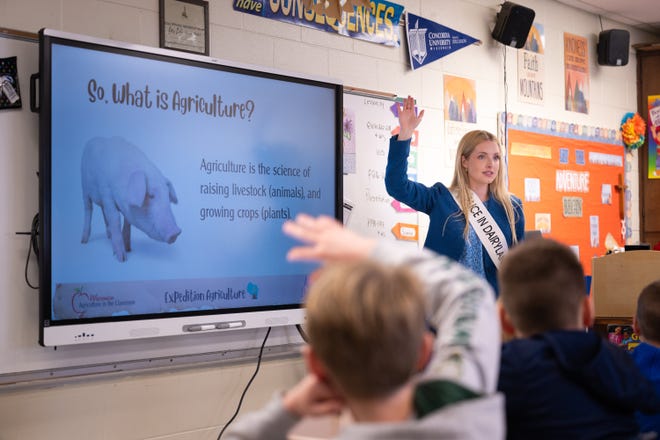
Think about the first time you ate a green bean or tomato right out of the garden, still warm from the sun. Or how about the first time you helped harvest produce that went into a meal you ate later that day? Farm to School (F2S) helps encourage these types of connections between Wisconsin’s students and the food they eat.
According to the Wisconsin Department of Public Instruction, F2S “is a movement that promotes the use of locally- and regionally-grown foods in schools.” This could include “nutrition education in classrooms, farmer visits, signage promoting local foods, serving local foods in the cafeteria, school gardens,” or any other activity that meets the needs of each community.
Farm to School benefits not only the schools and students, but local farmers and the overall community. Specific benefits vary depending on the activities each school participates in, but there are a few general advantages the program sees. Students and teachers have access to locally grown, delicious produce in their school lunches, and may have the opportunity for hands-on learning, while farms of all sizes can participate in a new market. Supporting local producers also helps create jobs, which contributes to the economic development of the whole community.
At my high school, we had different programs that created local connections with our food and the agriculture industry. As an FFA member, our Rio High School FFA chapter hosted a “Food for America” event at our local elementary school. FFA members brought their livestock animals to the school, where students from kindergarten through fifth grade could interact with different species of animals and learn where their food comes from.
We focused on sharing how farmers raise their livestock and the many different products sourced from livestock animals that we use in our everyday lives. We also grew a school garden with plants in our greenhouse, and food from that garden was served at school lunches. These lunches were delicious when complete with fresh fruit and vegetables. This further strengthened the connection our school district had with agriculture.
As Alice in Dairyland, I have been lucky to bring agriculture to hundreds of Wisconsin’s students this year. Through the Expedition Agriculture program, fourth-grade students are exposed to general information about Wisconsin’s top commodities, especially specialty crops. Through a Specialty Crop Block Grant from the U.S. Department of Agriculture, we are also able to leave behind six specialty crops for students to sample during an activity with their teacher.
The Wisconsin Potato Promotions and Grower Auxiliary Board, through the Wisconsin Potato and Vegetable Growers Association, has a series of hands-on activities I have taken to schools around the state, sharing information about Wisconsin potatoes. Wisconsin dairy and agricultural careers are other topics I frequently share with students to showcase the many different job opportunities within agriculture.
The Wisconsin Department of Public Instruction has several ways to get involved on your own, and a collection of resources to bring Farm to School to your community. Visit dpi.wi.gov and search “Farm to School” for more information.

Ashley Hagenow is Wisconsin’s 76th Alice in Dairyland
